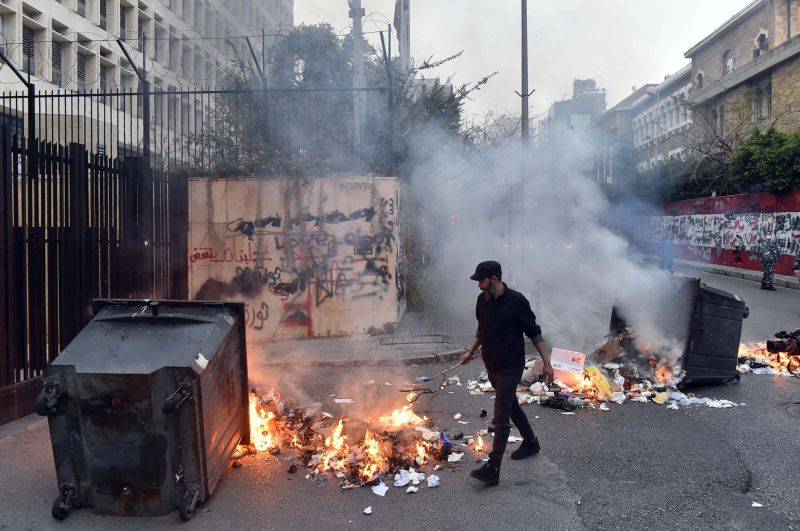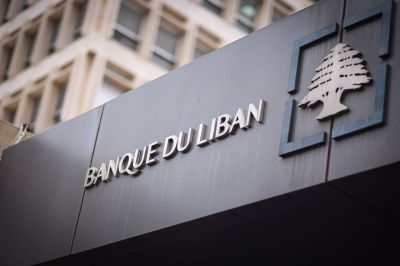
Protesters burn garbage outside Banque du Liban in Beirut. (Credit: Hussam Shbaro)
BEIRUT — Top government officials warned on Tuesday that import subsidies would be wound down over the coming months, citing declining dollar reserves at Banque du Liban — but in doing so, have called into question the calculation of those reserves and BDL Gov. Riad Salameh’s commitment to preserving a minimal level of depositors’ dollars kept at the central bank.
Caretaker Premier Hassan Diab told Reuters that subsidies on an array of imported products, including many essential goods, would last until June.
His finance minister, Ghazi Wazni, was more explicit in an interview with Bloomberg News. Wazni said the central bank currently holds $16 billion in foreign reserves, of which “only $1 to $1.5 billion can be used to fund subsidies, enough for two to three months.”
According to comments from Diab shared with L’Orient Today, BDL holds $16.7 billion in foreign reserves, but that figure includes eurobonds — dollar-denominated debt issued by the Finance Ministry — worth around $700 million to $1 billion based on market value.
In mid-February, Salameh told L’Orient Today that the central bank held $17.214 billion in hard currency reserves — a number that squares with Diab’s and Wazni’s figures if eurobonds are included. Subsidies drain about $540 million per month, according to the Economy Ministry.
However, if BDL holds $16.7 billion in foreign reserves, it appears to have crossed a red line laid down by the central bank governor himself when he promised not to touch mandatory reserves — money that banks must keep at BDL as a failsafe for financial stability.
Under current regulations, banks must deposit a minimum of 15 percent of their total foreign currency liabilities at BDL — most of which ultimately belongs to depositors.
At the end of December, the country’s banks held about $118.4 billion in foreign currency liabilities, according to statistics issued by BDL.
At best, $1 billion of this is in “fresh” currency, for which there is no reserve requirement, a major banker told L’Orient Today on condition of anonymity.
Based on current trends, the remaining $117.4 billion in liabilities should have shrunk by about $800 million per month, or some $2 billion through mid-March, leaving $115.4 billion in foreign currency liabilities for the purposes of calculating the required reserve.
However, 15 percent of this figure yields a foreign reserve requirement of about $17.3 billion — significantly higher than the amount of hard currency BDL still has, according to the figures of Diab, Wazni and even Salameh.
BDL statistics do not indicate a sharp escalation in the rate of depositor withdrawals, and no change has been made to the required reserve ratio.
The calculations suggest that the central bank no longer has enough hard currency to cover the reserve requirement — a direct contradiction of Salameh’s stated policy and the putative reason for an early end to subsidies.
The central bank governor has warned multiple times that he would not dip into the mandatory reserves to fund subsidies, and that when BDL’s other foreign currency reserves were exhausted, subsidies would end.
In an interview with Al Hadath in early December, Salameh said that this would only allow BDL to maintain subsidies for two more months.
If BDL has spent part of the required reserves, it is unclear why it would now refuse to spend more of it, or why a further $1 to $1.5 billion is available for subsidies, as Wazni said.
BDL denied touching obligatory reserves last month, but did not provide further information, including on the amount of mandatory dollar reserves banks had placed at BDL, despite L’Orient Today making several requests for this information over the past month. At the time of publication, the central bank still had not provided the requested information on usable reserves.
A spokesperson for the finance minister offered no further clarification of Wazni’s remarks.
